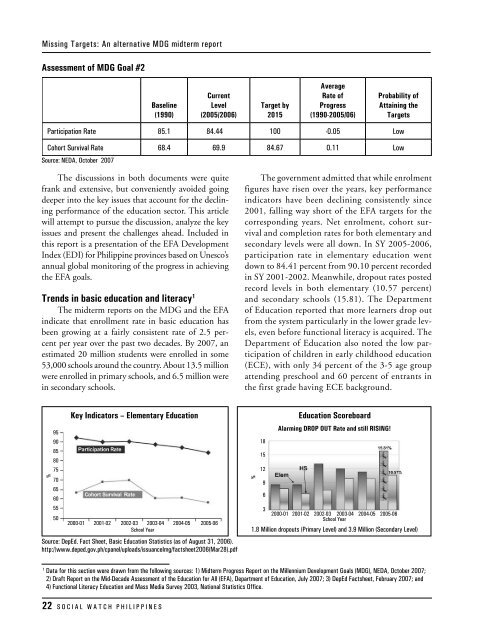one big file - Social Watch
one big file - Social Watch
one big file - Social Watch
You also want an ePaper? Increase the reach of your titles
YUMPU automatically turns print PDFs into web optimized ePapers that Google loves.
Missing Targets: An alternative MDG midterm report<br />
Assessment of MDG Goal #2<br />
Baseline<br />
(1990)<br />
Current<br />
Level<br />
(2005/2006)<br />
Target by<br />
2015<br />
Average<br />
Rate of<br />
Progress<br />
(1990-2005/06)<br />
Probability of<br />
Attaining the<br />
Targets<br />
Participation Rate 85.1 84.44 100 -0.05 Low<br />
Cohort Survival Rate 68.4 69.9 84.67 0.11 Low<br />
Source: NEDA, October 2007<br />
The discussions in both documents were quite<br />
frank and extensive, but conveniently avoided going<br />
deeper into the key issues that account for the declining<br />
performance of the education sector. This article<br />
will attempt to pursue the discussion, analyze the key<br />
issues and present the challenges ahead. Included in<br />
this report is a presentation of the EFA Development<br />
Index (EDI) for Philippine provinces based on Unesco’s<br />
annual global monitoring of the progress in achieving<br />
the EFA goals.<br />
Trends in basic education and literacy 1<br />
The midterm reports on the MDG and the EFA<br />
indicate that enrollment rate in basic education has<br />
been growing at a fairly consistent rate of 2.5 percent<br />
per year over the past two decades. By 2007, an<br />
estimated 20 million students were enrolled in some<br />
53,000 schools around the country. About 13.5 million<br />
were enrolled in primary schools, and 6.5 million were<br />
in secondary schools.<br />
The government admitted that while enrolment<br />
figures have risen over the years, key performance<br />
indicators have been declining consistently since<br />
2001, falling way short of the EFA targets for the<br />
corresponding years. Net enrolment, cohort survival<br />
and completion rates for both elementary and<br />
secondary levels were all down. In SY 2005-2006,<br />
participation rate in elementary education went<br />
down to 84.41 percent from 90.10 percent recorded<br />
in SY 2001-2002. Meanwhile, dropout rates posted<br />
record levels in both elementary (10.57 percent)<br />
and secondary schools (15.81). The Department<br />
of Education reported that more learners drop out<br />
from the system particularly in the lower grade levels,<br />
even before functional literacy is acquired. The<br />
Department of Education also noted the low participation<br />
of children in early childhood education<br />
(ECE), with only 34 percent of the 3-5 age group<br />
attending preschool and 60 percent of entrants in<br />
the first grade having ECE background.<br />
%<br />
95<br />
90<br />
85<br />
80<br />
75<br />
70<br />
65<br />
60<br />
55<br />
50<br />
Key Indicators – Elementary Education<br />
2000-01 2001-02 2002-03 2003-04 2004-05 2005-06<br />
School Year<br />
Source: DepEd. Fact Sheet, Basic Education Statistics (as of August 31, 2006).<br />
http://www.deped.gov.ph/cpanel/uploads/issuanceImg/factsheet2006(Mar28).pdf<br />
%<br />
18<br />
15<br />
12<br />
9<br />
6<br />
3<br />
Education Scoreboard<br />
Alarming DROP OUT Rate and still RISING!<br />
2000-01 2001-02 2002-03 2003-04 2004-05 2005-06<br />
School Year<br />
1.8 Million dropouts (Primary Level) and 3.9 Million (Secondary Level)<br />
1<br />
Data for this section were drawn from the following sources: 1) Midterm Progress Report on the Millennium Development Goals (MDG), NEDA, October 2007;<br />
2) Draft Report on the Mid-Decade Assessment of the Education for All (EFA), Department of Education, July 2007; 3) DepEd Factsheet, February 2007; and<br />
4) Functional Literacy Education and Mass Media Survey 2003, National Statistics Office.<br />
22 S O C I A L W A T C H P H I L I P P I N E S

















